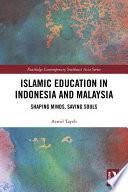
Curriculum Renewal for Islamic Education
Critical Perspectives on Teaching Islam in Primary and Secondary Schools
This book demonstrates how and why it is necessary to redesign Islamic Education curriculum in the K-12 sector globally. From Western public schools that integrate Muslim perspectives to be culturally responsive, to public and private schools in Muslim minority and majority contexts that teach Islamic Studies as a core subject or teach from an Islamic perspective, the volume highlights the unique global and sociocultural contexts that support the disparate trajectories of Islamic Education curricula. Divided into three distinct parts, the text discusses current Islamic education curricula and considers new areas for inclusion as part of a general renewal effort that includes developing curricula from an Islamic worldview, and the current aspirations of Islamic education globally. By providing insights on key concepts related to teaching Islam, case studies of curriculum achievements and pitfalls, and suggested processes and pillars for curriculum development, contributors present possibilities for researchers and educators to think about teaching Islam differently. This text will benefit researchers, doctoral students, and academics in the fields of secondary education, Islamic education, and curriculum studies. Those interested in religious education as well as the sociology and theory of religion more broadly will also enjoy this volume.
- ISBN 13 : 9780367227739
- ISBN 10 : 0367227738
- Judul : Curriculum Renewal for Islamic Education
- Sub Judul : Critical Perspectives on Teaching Islam in Primary and Secondary Schools
- Pengarang : Taylor & Francis Group,
- Penerbit : Routledge
- Bahasa : en
- Tahun : 2021
- Halaman : 284
- Google Book : http://books.google.co.id/books?id=D5IOzgEACAAJ&dq=intitle:Islamic+Education&hl=&source=gbs_api
-
Ketersediaan :
Foreword by Mike Waggoner, series editor -- Introduction / Nadeem A. Memon and Mohamad Abdalla -- Islamic studies curriculum -- Qur'an : curriculum realities and ideals / Samir Mahmoud -- Fiqh (practical living) : Curriculum realities and ...









